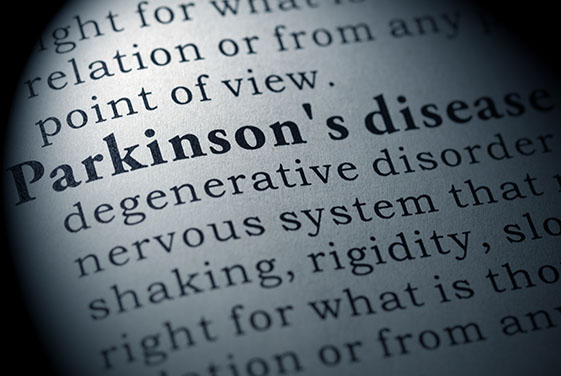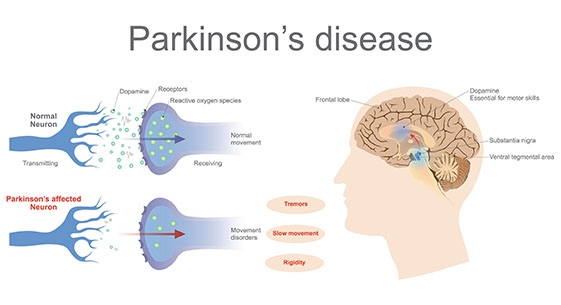What is Parkinson’s Disease

Parkinson’s Disease is a neurological condition that affects the brain and much more. It is a long-term condition which generally gets worse over time. People with Parkinson’s disease experience a loss of nerve cells in the part of their brains responsible for controlling voluntary movements.
This part of the brain is called the substantia nigra. The substantia nigra is a small cluster of cells deep in the centre of the brain contained within an area called the basal ganglia. The nerve cells in the substantia nigra produce a chemical called dopamine which helps the communication of messages from the brain to the rest of the body via the central nervous system (the brain and spinal cord). As these cells are lost, people with Parkinson’s disease experience a loss of dopamine and the messages controlling movement stop being transmitted efficiently.
Many people think that Parkinson’s is a condition that only affects older people. Although, it is more prevalent amongst the aging population, it can affect anyone at any age and there are thousands of people who have been diagnosed under the age of 40. Parkinson’s Disease seems to affect men more than women.
What Causes Parkinson’s Disease
This is the million-dollar question! Understanding where and how Parkinson’s begins will be absolutely fundamental to identifying and developing treatments that can stop it and even prevent it altogether. At present, we don’t know exactly what causes Parkinson’s Disease, however, there is new and revolutionary research to suggest that Parkinson’s Disease could start in the gut and not the brain as always assumed.
Researchers at the Van Andel Research Institute, in Michigan, looked at data on 1.7 million people over half a century. The study, published in Science Translational Medicine, showed the risk of Parkinson’s was 20% lower in the people who had had their appendix removed. It also showed that people whose appendix had been removed were less likely to develop the neurodegenerative disease as the appendix, long thought of as pointless in the human body, contained the substance that kills brain cells.
The appendix is a little sac at the opening of the large intestine and is probably the best known vestigial (without a use) organ in the human body.
And analysing the content of people’s appendixes showed they contained the same toxic protein – called alpha synuclein – that is found in the brains of Parkinson’s patients.
The appendix is clearly not the whole of the story (otherwise removing it would prevent all cases).
But the researchers argue the guts are a breeding ground for the protein, which then travels up the vagus nerve and into the brain.
There has been evidence to suggest that there could be other causes of Parkinson’s Disease. Studies have shown that there could be a genetic factor with Parkinson’s and therefore there is an increased risk of Parkinson’s Disease within some families. Research has also shown a link between Parkinson’s Disease and people who have come into contact with a certain toxin or toxins found in the environment via pesticides and chemicals used in agriculture. Sadly, no specific toxin or chemical has been identified from research, but this is ongoing as a possible cause.

